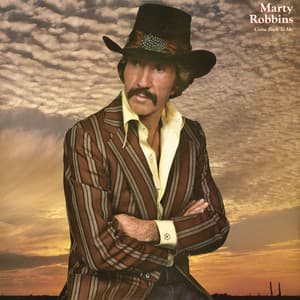
The Enduring ache of a Fading Romance: A Cry for Past Affection
Some songs don’t just recall a time; they are a time—a shimmering memory wrapped in a melody. Such is the case with “Pretty Mama”, a truly heartfelt, mid-tempo lament recorded by the incomparable Marty Robbins. Released in 1956 on Columbia Records, “Pretty Mama” was one of the early singles that helped solidify Robbins’ burgeoning career as a crossover sensation. While it didn’t achieve the colossal, pop-chart success of later signature hits like “A White Sport Coat (And a Pink Carnation)” or “El Paso”, it found a strong footing and connection with his country and rockabilly audience, a critical stepping stone in the pre-Gunfighter Ballads era that showcased his versatility.
The track, which Marty Robbins wrote himself (sometimes credited as Martin Robinson), is built on a deceptively simple, blues-infused country-rock framework. Its story is one of fading love, a universal ache that resonates with anyone who has watched the light go out of a partner’s eyes. The narrative is a direct, pleading address from a man to his wife or long-time sweetheart. He observes the changes in their relationship—the missing kindness, the lack of affection, the cold distance that has crept into their home. He doesn’t accuse; he merely begs for the way things used to be, for his “pretty mama” to come back to him. The emotional heart of the song is the stark contrast between the vibrant love of the past and the desolate present.
The meaning of “Pretty Mama” is laid bare in its raw vulnerability. It’s a ballad of domestic distress that avoids histrionics, choosing instead a quiet, desperate plea for revival. It speaks to the fear of obsolescence in a long-term relationship, the terrifying realization that you might be losing the person you cherish most, not to another person, but to a slow, internal dying of the spark. It’s about remembering the honeymoon phase and using that memory as a shield against the present despair. For an older audience, this song evokes that particular, tender nostalgia for youthful affection—the very essence of what made the relationship special—and the melancholic understanding that sometimes, you can’t go back.
What makes Marty Robbins’ performance so compelling is the understated delivery. He wasn’t just a golden-voiced crooner; he was a master storyteller who could infuse simple words with deep, palpable emotion. The original 1956 recording features a lean arrangement, typical of the era, letting his vocal take center stage. You hear the vulnerability in his voice, the slight tremor of a man fighting to keep his dignity while admitting his fear. The restrained use of an electric guitar (often featuring the work of session greats like Ray Edenton) and a steady rhythm section gives the tune a gentle, almost rocking sway, perfect for a slow dance that might bridge the emotional chasm between the two people. “Pretty Mama” is a gem from the early chapter of a legend’s career, a simple song about a complicated, timeless feeling, and a reflective piece that reminds us all to cherish those tender moments before they become only a distant memory.